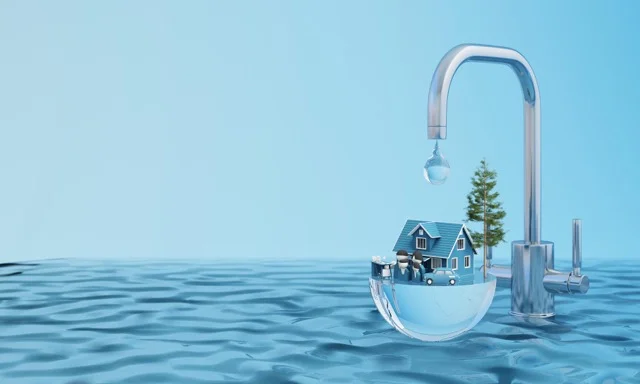All about Reclaim Waste
All about Reclaim Waste
Blog Article
The 9-Minute Rule for Reclaim Waste
Table of ContentsHow Reclaim Waste can Save You Time, Stress, and Money.Not known Details About Reclaim Waste Reclaim Waste - QuestionsThe Basic Principles Of Reclaim Waste Excitement About Reclaim Waste
Domestic sewer waste refers to the waste and items from a household septic storage tank. The appropriate administration and disposal of domestic sewage waste require fluid waste to be moved to a sewer therapy plant where the appropriate methods and equipment are applied to purify and dispose of waste.
Industrial waste typically consists of potential hazards, such as combustible products or a mixture of liquid and solid waste items, and requires an advanced and thorough disposal procedure. The disposal of commercial waste commonly involves the purification of waste before transportation to guarantee secure and correct disposal. Hazardous waste is produced from results and overflow of industrial procedures and production.
This type of waste can not use the exact same sewer monitoring transport or procedures as septic or commercial fluids. The commercial waste monitoring process requires the examination and testing of liquid waste prior to it undertakes the disposal process (liquid waste removal melbourne). Runoff waste is the fluid waste that comes from runoff and excess stormwater in very populated areas or cities
Runoff waste can create contamination and flooding if not dealt with properly. Learn extra concerning drain cleansing and waste monitoring. Making certain correct waste administration can stop disasters and decrease environmental injury. Both people in residential setups and specialists in commercial or manufacturing sectors can gain from comprehending the processes and regulations of liquid waste administration.
Some Of Reclaim Waste
Get in touch with PROS Solutions today to discover about our waste monitoring and disposal services and the correct methods to look after the fluid waste you create.
(https://reclaimwaste1.mystrikingly.com/blog/efficient-liquid-waste-disposal-in-melbourne-why-reclaim-waste-is-your-go-to)Do you know what takes place to your water when you end, flush the commode or drain the cleaning maker? No? Well, it deserves understanding. This so-called 'wastewater' is not just an important resource but, after therapy, will be released to our land, waterways or the ocean. Used water from bathrooms, showers, baths, kitchen area sinks, laundries and commercial procedures is called wastewater.

water utilized to cool equipment or tidy plant and devices). Stormwater, a kind of wastewater, is runoff that flows from farming and city locations such as roofs, parks, gardens, roads, paths and gutters into stormwater drains, after rain. Stormwater moves unattended straight to local creeks or rivers, ultimately reaching the ocean.
The Basic Principles Of Reclaim Waste
In Queensland, most wastewater is dealt with at sewer therapy plants. Wastewater is transported from residential or industrial sites with a system of drains and pump stations, known as sewerage reticulation, to a sewer therapy plant.
The Division of Natural Resources encourages city governments regarding handling, operating and preserving sewerage systems and therapy plants. In unsewered locations, neighborhood federal governments might need householders to install specific or household sewer treatment systems to treat domestic wastewater from toilets, kitchens, bathrooms and washings. The Division of Natural Resources authorises making use of family systems when they are proven to be effective.
In some new neighborhoods, therapy of some stormwater to eliminate clutter, sand and gravel has actually begun making use of gross contaminant traps. Wastewater therapy happens in four phases: Removes strong issue.
Wastewater after that moves right into big containers where solids settle and are eliminated as sludge. Grease and residue are skimmed from the surface area. Makes use of tiny living microorganisms called micro-organisms to break down and remove continuing to be dissolved wastes and great particles. Micro-organisms and wastes are integrated in the sludge. Removes nitrogen and phosphorus nutrients that could trigger algal blossoms in our waterways and intimidate marine life.
How Reclaim Waste can Save You Time, Stress, and Money.
Nutrient elimination is not readily available at all sewage therapy plants since it requires costly specialised equipment. Clear fluid effluent created after treatment might still include disease-causing micro-organisms - liquid waste disposal.

This typically implies wastewater needs to be dealt with or pollutants eliminated before it can be released to rivers. Many wastewater flows right into the sewage system. Under the Act, local governments carry out authorizations and licences for eco pertinent activities (ERAs) involving wastewater launches that could have a regional influence. The division administers authorizations and licences to Periods including wastewater releases that could have a regional or statewide influence.
Reclaim Waste - Questions
Or else, examples are considered research laboratory analysis. Typically several tests are needed to establish the degrees of each of the various toxins such as oils, heavy metals and pesticides in water. Tracking supplies valid details about water quality and can verify that licence conditions are being met. The details acquired through surveillance gives the basis for making water top quality decisions.
Report this page